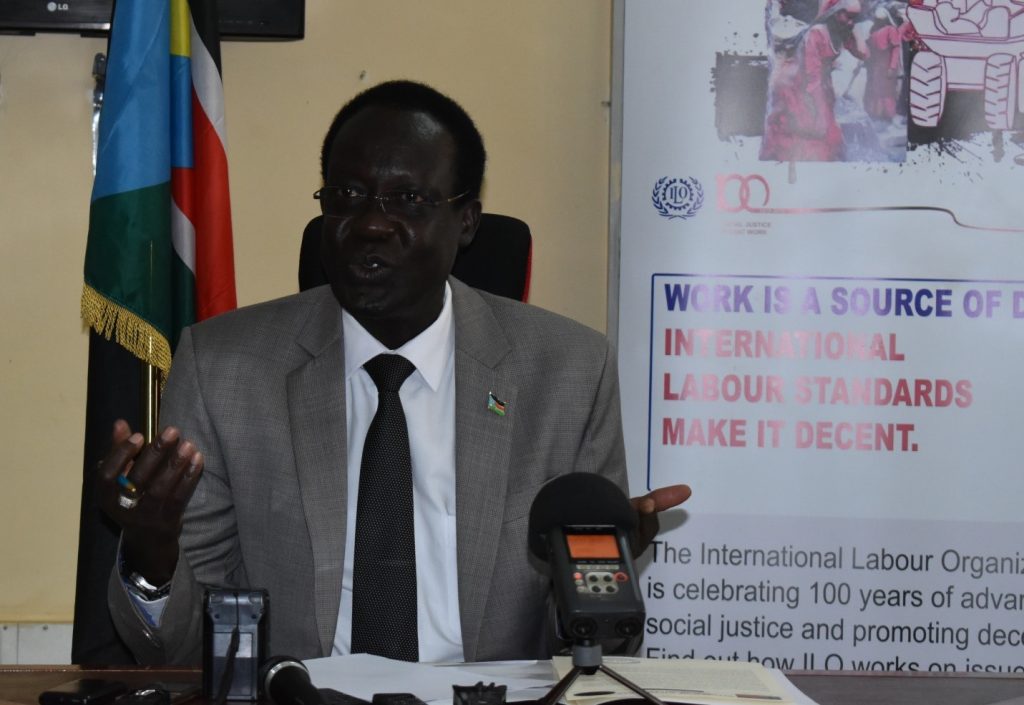
By Ochaya Jackson
The Ministry of Labour has initiated labour market assessment targeting private sector which ranges from United Nations’ Agencies, Embassies and Foreign Missions, International and National Organizations, Civil Society Organizations, and Companies. The move was stated in a press conference held in Juba on Friday 14th August 2020 at the Ministry’s premises by the Labour Minister James Hoth Mai.
According to the Minister, this comes as the country’s conflict had caused severe economic, social and political disorders. But he said the forecasts for viable peace are being elevated as the September 2018 Peace Agreement is being implemented.
“The South Sudanese conflict has caused serious economic, social and political dislocations. All facets of South Sudanese society have been adversely affected. The private sector, including civil society organizations (CSOs), has been hit hard by the crisis. As the country implements the Revitalized Agreement on the Resolution of Conflict in the Republic of South Sudan (R-ARCISS), the prospects for sustainable peace are being raised. With peace sustainable development will be possible”, Labour Minister James Hoth Mai explained.
“While the public sector has a huge role to play in the restoration of sustainable peace and development, the private sector also has a crucial contribution to make. The private sector is the engine of economic growth in any country, especially those doing well economically. It produces goods and services as well as provides jobs to people. The public sector alone cannot provide enough jobs for a country, especially where the majority of the people are in the youth age bracket”, Hoth added.
He further asserted that the reasons for the labour market assessment in the private sector are to understand the status of the sector, how it can be promoted, to know the workforce, and the rate of unemployment in the country.
“To fully grasp the status of the private sector in South Sudan and also how it can be enhanced, it is necessary to take stock of the current situation of the sector. For this reason, the Ministry of Labour initiated this assessment of the private sector. It also wants to know the workforce in this sector and know the level of unemployment in the country. This will include nationals who are working in United Nations’ Agencies, Embassies and Foreign Missions”, James asserted.
Besides, he said “we want to know South Sudanese who are working in other sectors like NGOs or companies because in our act [Labour Act 2017] 80% of employment should come from South Sudan[ese] up to now we don’t have data. Part of this exercise also, we will know those who are not coming to take the work permit; people are not respecting our laws, some people are evading even the work permit with this exercise it will be very easy for us to know those who are here and are obliged to have their work permit” Hoth said.
The Minister noted that there are visas’ frauds being done by some foreigners saying because the country is open and there is no control.
“Some foreigners when they come to South Sudan they come as visitors you get from the visas that he is visiting but because our country is open we don’t have control over them. They come and maneuver inside here and then all of sudden you will get them working, by doing so, we are collaborating with immigration. We will know the type of visas you have when you are coming to seek the work permit we are not going to prevent anybody but at least we must know those who are coming to our country”, the Minister noted.
The work permit is renewed annually and it costs $2,000 for technical positions held by foreigners, and $600 for other positions or categories, according to the Labour Ministry.
The assessment will be conducted in the first and second phases, in which phase one falls within the nation’s Capital Juba where it houses many public and private institutions, and the second phase targets institutions operating outside Juba or States.
“The assessment will be carried throughout South Sudan. Considering the challenging situation in the country, it will be executed in phases. The first phase will focus on the national capital Juba, where most of the for-profit [especially private businesses] and not –for profit organizations [especially NGOs] are operating or headquartered. The second phase will cover the targeted institutions operating outside the national capital”, Hoth informed, adding “as a result, countries pay special attention to the performance of this sector. South Sudan is no exception though the conflict has impacted negatively on the health of the private sector, there is however no-good data or information on the sector, thus, this assessment will fill this information gap” the Minister explained.
James Hoth Mai said the exercise is expected to run for one month adding that forms had been developed already and that the ministry targets more than thirty thousand working class in the private sectors.
“We have forms here that we have developed in Ministry, we will reach out but we are urging them [private sectors] also to send their representative (s) to come and take the forms. We are targeting one month to finish this exercise. We are talking of 30-to-40 thousand people who are working in the private sector (s) but may be they will be more”, Mai disclosed.

